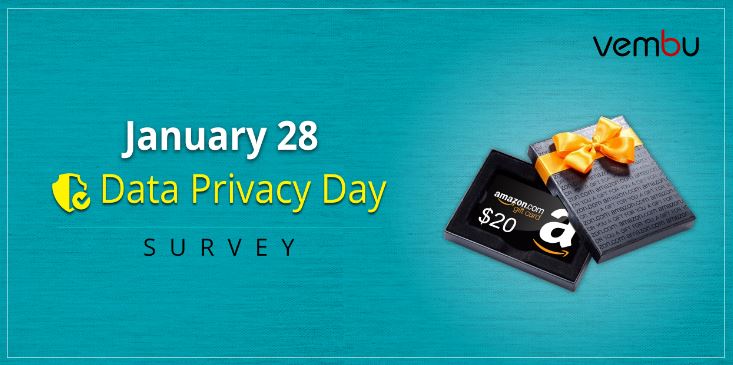Data Privacy Day began in the United States and Canada in January 2008 as an extension of the Data Protection Day celebration in Europe. Data Protection Day commemorates the Jan. 28, 1981, signing of Convention 108, the first legally binding international treaty dealing with privacy and data protection. Data Privacy Day is observed annually on Jan. 28.
The National Cyber Security Alliance (NCSA) officially leads the Data Privacy Day campaign and is advised by a distinguished advisory committee of privacy professionals to help the campaign align with the most current privacy issues in a thoughtful and meaningful way.Data Privacy Day is the signature event in a greater privacy awareness and education effort. Year-round, NCSA educates consumers on how they can own their online presence and shows organizations how privacy is good for business.
Take this quick survey and stand a chance to gift yourself an Amazon voucher worth $20
On the event of Data Privacy Day celebrated on Jan. 28th, Vembu is conducting a 40-second survey to help individuals and businesses understand the importance of user privacy and also data protection.
Start the Survey
We are in an unparalleled age of technological growth. By 2020, there will be an estimated 24 billion internet-connected devices globally – which is more than four devices for every person. Consumers have an increased understanding about the importance of privacy and want to know how their information and is being used and protected. This new era of privacy has tremendous benefits; yet, coupled with these infinite opportunities are challenges. As businesses learn to extract value from and utilize data at a deeper level, it is essential for companies to be extremely conscientious about protecting personal information. For any organization, respecting consumers’ privacy is a smart strategy for inspiring trust and enhancing reputation and growth.
Safeguarding Your Data and Managing Your Privacy Personal info is like money , its valuable and you have protect it.Additionally information about you, such as your purchase history or location are also very important . Few points you have to understands before starts sharing your infomration
- Share with care. Think before posting about yourself and others online. Consider what it reveals, who might see it and how it could be perceived now and in the future.
- Own your online presence. Set the privacy and security settings on websites and apps to your comfort level for information sharing. Each device, application or browser you use will have different features to limit how and with whom you share information.
- Lock down your login: Your usernames and passwords are not enough to protect key accounts like email, banking and social media. Strengthen online accounts and use strong authentication tools like a unique, one-time code through an app on your mobile device.


